The two writers do match their chosen candidates, then. Angelou, with a well-known and colorful life story featuring odds overcome and the triumph of the human spirit, has been embraced as an icon of middlebrow empowerment. With her, you know exactly what you're getting because you've gotten it so many times before, and yet you can congratulate yourself for (mildly) bucking the system. Electing Clinton would make history, but it also promises to bring a familiar presence back to the White House.
Morrison, as the only living Nobel laureate in literature in a fundamentally unbookish nation, is a homegrown exotic, the embodiment of the American notion that if you can't quite understand it, it must be literature. She is an overwhelming presence, handsome and stately, with a magnificent voice. Like Obama, with his Harvard degree and pristine, international sleekness, she seems too good and too smart for us, the sort of American appreciated by foreigners with obscurely discriminating standards. The electorate famously prefers guys they can imagine dropping by for a barbecue over intimidating intellectuals, but that insecurity has been biting us in the ass for the past eight years.
Thursday, January 31
The battle of the literary endorsements
The Big Green Bookshop
Simon Key and Tim West took redundancy last August when the branch of Waterstone's they worked at closed in Wood Green, north London, leaving the local community without a local bookshop. Angered and depressed. they decided to open their own shop and depression soon turned to elation when more than 700 people joined them in protest at the closure. Buoyed by this local outpouring of emotion they quickly found a suitable 700ft premises, just off the high street close to where Waterstone's had traded. They hope to fill it with approximately 8-9,000 titles.
These gents have a blog and it looks awfully familiar. An Atlantic Ocean separates us but through our matching blog templates we have formed an unshakable bond. What a beautiful place, this Internet.
Wednesday, January 30
Two from the Times
“Titlepage” will combine elements of “Apostrophes,” a popular French literary program; “The Charlie Rose Show” on public television; and “Dinner for Five,” in which a group of actors discussed their craft, on the Independent Film Channel.
The Times comments on Steve Jobs' dismissal of Kindle on the basis that "people don't read anymore:"
A survey conducted in August 2007 by Ipsos Public Affairs for The Associated Press found that 27 percent of Americans had not read a book in the previous year. Not as bad as Mr. Jobs’s figure, but dismaying to be sure. Happily, however, the same share — 27 percent — read 15 or more books.
In fact, when we exclude Americans who had not read a single book in that year, the average number of books read was 20, raised by the 8 percent who read 51 books or more. In other words, a sizable minority does not read, but the overall distribution is balanced somewhat by those who read a lot.
Tuesday, January 29
Herman, Edgar & Me
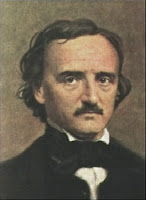 In eighth grade I sucked at life. Even more than I do now. In English class the delightful* Lady Finnegan's teachings went in one ear and out the other. Honestly, I still don't really, truly know what an adverb is. I mean that sincerely.
In eighth grade I sucked at life. Even more than I do now. In English class the delightful* Lady Finnegan's teachings went in one ear and out the other. Honestly, I still don't really, truly know what an adverb is. I mean that sincerely.Interestingly, of all the classics we read that year the only story that I remember engaging with on any real intellectual level was Ambrose Bierce's An Occurrence at Owl Creek Bridge. I read it several times. Thinking back to adolescent me, that attraction makes a lot of sense. But Hart Crane, Edgar Allan Poe, Herman Melville, Nathaniel Hawthorne, much like the adverb lesson, went in one ear and out the other. I was not ready for them. So, in what is far from my first attempt to bridge the chasm in my knowledge of early American literature, I picked up Melville's Complete Shorter Fiction and Poe's Complete Stories and Poems at the library. I will read them both incompletely.
Incidentally, today is the 163rd anniversary of the first publication of "The Raven" in the New York Evening Mirror. Happy Birthday, Raven! What? What's that you say? You say, "Nevermore." Oh you incorrigible Raven!
Also:
"The Raven" performed by the incomparable Vincent Price
Spectator review of a new Poe biography
Poe Museum in Richmond, Virginia
I knew about the Baltimore Ravens...
...but I had no idea about the mascots.
*No.
Monday, January 28
First of a 50-part series
I foresee bitter debate in the Spectator editorial room on the topic of whether to go with Moby Dick or The Scarlet Letter for Massachusetts. Oh and then there's Little Women. And somewhere out there I hear someone saying something about Infinite Jest. But I'll tell you what, if they want to nail the essence of Massachusetts they couldn't go wrong with the WASP high jinks of The Wapshot Chronicle.
Blue Highways
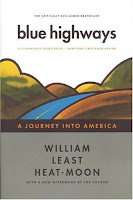 A few years ago I was unemployed and spending much of my time feebly cobbling together a series of short stories that I have long since abandoned. There was a brief stage where I seriously considered setting out in an automobile (a contraption I did not and do not own) with a sack of Moleskine notebooks, a chunk of my savings account, and the misguided notion that I could pen a great American travel book. I would travel on America’s back roads, visit America’s small towns, and talk to America’s battered middle class.
A few years ago I was unemployed and spending much of my time feebly cobbling together a series of short stories that I have long since abandoned. There was a brief stage where I seriously considered setting out in an automobile (a contraption I did not and do not own) with a sack of Moleskine notebooks, a chunk of my savings account, and the misguided notion that I could pen a great American travel book. I would travel on America’s back roads, visit America’s small towns, and talk to America’s battered middle class.I ended up making it as far as the Pioneer Square-Skid Road District, home of Elliott Bay Book Company. It was there that I picked up Bill Bryson’s The Lose Continent: Travels in Small-Town America. I’m no connoisseur of travel literature, I’ve never read Chatwin or Theroux or Steinbeck’s Travels with Charley. For some reason my first stop was Bill Bryson. This was a terrible mistake.
I am loath to quote an Amazon reviewer, but M. Leslie has The Lost Continent pegged when she writes: “There's no detail of his travels, just a repetitive litany of how bad the food is, how horrible the motel, how fat the tourists, and how dull the road.” The tone is consistently caustic, mean-spirited and condescending. What a unfortunate missed opportunity to write a worthwhile book about America.
If I were to do it, I thought, I’d do it all differently. I’d roll into town, seek out the local diners and saloons, the mom and pop shops, the butchers, the bakers, the candlestick makers. I’d approach the people and the towns with genuine interest and curiosity. I'd treat those I encountered with respect rather than mockery. Ah, but one thing led to another and I got myself employed. The dream quickly faded, but I still felt there was a need for that book.
So it was a great relief to read William Least Heat-Moon’s Blue Highways recently and discover that I’m off the hook. THE great American travel book has already been written. Wheras Bryson struck out, Heat-Moon hammered it out of the park. His warmth, optimism and passion for American people and places shine through on every page.
In March 1978, having recently lost his wife and his job teaching college English, Heat-Moon departs Columbia, Missouri, and sets out on a three-month long trip over the back roads of the United States in a van he calls "Ghost Dancing." The book gets its title from the blue back roads of old American highway maps. Refreshingly, Heat-Moon is rarely the star of his travelogue. Blue Highways is memorable for the author’s ability to find fast friends wherever he stops. Peppering his prose with history, great conversation, philosophical musings, and the poetry of Walt Whitman, Heat-Moon offers an intimate portrait of an America often passed by in the age of interstate highways.
Nameless, Tennessee. Dime Box, Texas. Hat Creek, California. These places you'd be lucky to find on a map have a history worth telling and people worth knowing. With his compassion and fearlessness, Heat-Moon introduces us to boat builders and saloon keepers, a runaway teen, a born-again Christian, fishermen, farmers, college students and small town cops. How fortunate not only that a man would chronicle this kind of journey with exacting detail but that he's also a damn fine writer. I can't recommend this one highly enough.
William Least Heat-Moon in his own words:
Salon interview
Powell's interview
Sunday, January 27
Nikola Tesla: Strange Genius
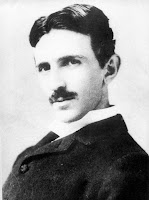 Kurt Andersen and Studio 360 tackle Tesla. Fascinating character. Very sad that the most exposure I'd had to Tesla before listening to this podcast was watching David Bowie portray him in The Prestige, the 2006 magician picture from Christopher Nolan. Tesla remains in the shadows of Marconi and Edison even though he trumped a couple of the inventions for which they're best remembered--invented the radio before Marconi and his AC walloped Edison's DC. Tesla was also pals with Twain, which earns him abundant cool points. Want more cool points? He invented a freaking death ray! Anyway, give the show a listen. Mike Daisey lends his storytelling talents to great effect.
Kurt Andersen and Studio 360 tackle Tesla. Fascinating character. Very sad that the most exposure I'd had to Tesla before listening to this podcast was watching David Bowie portray him in The Prestige, the 2006 magician picture from Christopher Nolan. Tesla remains in the shadows of Marconi and Edison even though he trumped a couple of the inventions for which they're best remembered--invented the radio before Marconi and his AC walloped Edison's DC. Tesla was also pals with Twain, which earns him abundant cool points. Want more cool points? He invented a freaking death ray! Anyway, give the show a listen. Mike Daisey lends his storytelling talents to great effect.
In the year 2000.....
With the Government desperately trying ever more imaginative ways to improve rates of exercise and participation in sport, officials are considering encouraging schools across the country to put the new generation of "active computer games" on the curriculum, to help the most at-risk youngsters out of their sedentary lifestyles.
Read this.... Take a look....
Saturday, January 26
Powell's Lost blog to return!
Friday, January 25
Blog, blog, blog, blog, blog, blog, blog
Many bloggers really don't write much at all. They are more like impresarios, curators, or editors, picking and choosing things they find on line, occasionally slapping on a funny headline or adding a snarky (read: snotty and catty) comment. Some days, the only original writing you see on a blog is the equivalent of "Read this.... Take a look.... But, seriously, this is lame.... Can you believe this?"
The Populist
Peter Wilson gets the gas face
 This is maddening. So you're gonna go to Sierra Leone, roll up your sleeves, dig in your heels, and do some nitty-gritty investigative journalism. Alright, that's great, we need more like you, Peter Wilson. Wait, what's that? You say you're not going to report on important issues confronting the people of Sierra Leone as we speak, you're going to leave that to noted scholar Kanye West? Ah, I see, you feel your time is better spent quibbling with the timeline laid out in the memoir of a former child soldier. A young man who survived a youth of unfathomable horror, was brought to the United States by UNICEF, earned a college degree, and is now dedicating his life to protecting the human rights he was denied. You say Ishmael Beah was 15 when he became a child soldier and not 13 as stated in his book. I say bravo, Peter Wilson, for chasing after this whale of a story with such gusto. Maybe for your next assignment you can go to the Congo and critique the cafeteria food in Dikembe Mutombo's hospital.
This is maddening. So you're gonna go to Sierra Leone, roll up your sleeves, dig in your heels, and do some nitty-gritty investigative journalism. Alright, that's great, we need more like you, Peter Wilson. Wait, what's that? You say you're not going to report on important issues confronting the people of Sierra Leone as we speak, you're going to leave that to noted scholar Kanye West? Ah, I see, you feel your time is better spent quibbling with the timeline laid out in the memoir of a former child soldier. A young man who survived a youth of unfathomable horror, was brought to the United States by UNICEF, earned a college degree, and is now dedicating his life to protecting the human rights he was denied. You say Ishmael Beah was 15 when he became a child soldier and not 13 as stated in his book. I say bravo, Peter Wilson, for chasing after this whale of a story with such gusto. Maybe for your next assignment you can go to the Congo and critique the cafeteria food in Dikembe Mutombo's hospital.Thursday, January 24
Irene Némerovsky
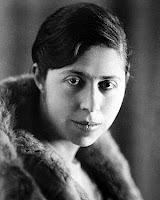 Recently much ink has been spent exposing the unfortunate details of Irene Némerovsky's literary life. We turn to the Cliffs Notes version. Jewish French woman builds literary fame in France with anti-Semitic novels. Jewish French woman dies in Auschwitz at the age of 39. Jewish French woman's Suite Francaise is translated to English more than sixty years after her death. Jewish French woman becomes a best-selling author in America and is "lionized as a significant writer of the Holocaust" even though said novel does not include a single Jewish character. The New Republic covers all the fascinating details.
Recently much ink has been spent exposing the unfortunate details of Irene Némerovsky's literary life. We turn to the Cliffs Notes version. Jewish French woman builds literary fame in France with anti-Semitic novels. Jewish French woman dies in Auschwitz at the age of 39. Jewish French woman's Suite Francaise is translated to English more than sixty years after her death. Jewish French woman becomes a best-selling author in America and is "lionized as a significant writer of the Holocaust" even though said novel does not include a single Jewish character. The New Republic covers all the fascinating details.
Time Machine
About 80 percent of the dozens of predictions in Wells’s 1901 book, Anticipations, were at least partly right and 60 percent were “extremely accurate,” writes Paul Crabtree, a retired federal analyst. Wells foresaw dramatic increases in the speed of travel, with most people transported in independent road vehicles and only heavy freight moving by rail. He recognized the future of the airplane, but relegated it to a footnote. He expected the size of cities to expand exponentially until the New York metropolitan area encompassed 40 million people—it has 19 million residents today. He thought the “irresponsible” wealthy class would grow, as would a poor, uneducable underclass whom technology would render unemployable. He predicted the decline of marriage and an increase in childless unions. Machines and technology would become the primary means of waging war, he wrote; military victories would be won “in the schools and colleges and universities.” He foresaw English—“but perhaps French”—becoming the dominant world language. He recognized the globalization that is a hallmark of the world economy a century hence.
Evildoers
In related news, the title of the latest Bond installment was revealed today. Quantum of Solace is a terrible, horrible, no good, very bad title.
Tuesday, January 22
Blue Highways
Readers who see a declining literate expression in America will find further evidence in the journals. Meriwether Lewis and William Clark presented their permanently important historical and anthropological record clearly and poignantly, often writing under trying and dangerous conditions. In our time, who of the many astronauts has written anything to compare in significance or force of language?I don't know, I think the astronauts were working with a mighty disadvantage. For one thing, space is dark. And it is, for the most part, void of living beings to interact with. And your couped up in a pod. Seems like any attempt at literate expression would quickly melt into philosophical chattering. Lewis and Clark were hobnobbing with natives, studying plants and animals, working the fur trade, and questing through treacherous terrain in foul weather. There's a story there, an actual narrative. Call me crazy, but the uncharted American West was a meatier subject than outer space. But yes, it's true, William Clark lacked a formal education and he was still probably handier with the quill than you average NASA scientist.
Nine bookstores worth a visit
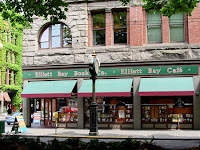 The Associated Press reports. Come on AP, why you talking to bookstore owners and PR turds when you could have asked actual people who, you know, visit the bookstore for reasons other than to collect a paycheck. Informed book buyers, for example. Would that have required actually visiting the bookstore yourself? Booooooring. Well, you could have just called me then. My bookstore made the list, along with three others on our sidebar over there.
The Associated Press reports. Come on AP, why you talking to bookstore owners and PR turds when you could have asked actual people who, you know, visit the bookstore for reasons other than to collect a paycheck. Informed book buyers, for example. Would that have required actually visiting the bookstore yourself? Booooooring. Well, you could have just called me then. My bookstore made the list, along with three others on our sidebar over there.
Elliott Bay Book Co.
101 S. Main St., Seattle; http://www.elliottbaybook.com/
Elliott Bay Book Co. is located in Seattle's historic Pioneer Square district, once the city's Skid Row but now known for nightclubs, galleries, sports arenas and architecture -- including the 1867 red-brick building that houses Elliott Bay.
Cedar shelves offer 150,000 new and used titles in rooms with exposed brick walls, and one or two readings are held every night. "It can be anyone from a first-time poet to Dave Sedaris returning for his 10th time," said Elliott Bay spokeswoman Tracy Taylor. "We had him here when nobody knew who he was and there were 15 people in the audience. He sang the Oscar Mayer song."
Links
- The Story of Night
- Oddly-named sleuths
- The video game as art
- 100 books every child should read
- Editing of Robert Frost's notebooks in dispute
- Manga-like editions of Shakespeare’s greatest hits
- Jean-Jacques Rousseau, the Enlightenment's party pooper
- Big Switch argues that Web may be oppressing as it liberates
Sunday, January 20
Does the news matter to anyone anymore?
I understand the economic pressures on newspapers. At this point, along with the rest of the wood-pulp Luddites, I've grasped that what was on the Internet wasn't merely advertising for journalism, but the journalism itself. And though I fled the profession a decade ago for the fleshpots of television, I've heard tell of the horrors of department-store consolidation and the decline in advertising, of Craigslist and Google and Yahoo. I understand the vagaries of Wall Street, the fealty to the media-chain stockholders, the primacy of the price-per-share.
What I don't understand is this:
Isn't the news itself still valuable to anyone? In any format, through any medium -- isn't an understanding of the events of the day still a salable commodity? Or were we kidding ourselves? Was a newspaper a viable entity only so long as it had classifieds, comics and the latest sports scores?
Oklahoma bastards
Home
More from an interview:
Ramona Koval: From war crimes to other kinds of crimes and episodes of political behaviour, Martha's Vineyard lends itself to memories of Chappaquiddick as well. Putting them on Martha's Vineyard, that was obviously a bit of a gift, wasn't it, there?
Robert Harris: It was great. I knew that I had to have my British prime minister living somewhere in the US to write this memoir and keep an eye on the war crimes court and my publisher suggested Martha's Vineyard because it's got all these wonderful associations with the Kennedys and the Clintons and the kind of liberal elite in the US. Katherine Graham the owner of The Washington Post had a house there, Walter Cronkite, Mike Wallace of CBS, all these people. And Rose Styron, the widow of William Styron the novelist, agreed to show me around and was incredibly kind and helpful.
There's nothing like a seaside resort like that in December, out of season, shuttered up, it's a perfect location. You know, the Atlantic rolling in, the mist, the cold, the empty shops, the lights in the gloom at night, it was perfect. So my ex-prime minister is holed up in the house of a media tycoon who's publishing his memoirs, trying desperately to finish the book. And that lent itself very well to the sort of mood of the book which is one of...you know, the promise of summer has gone, winter has set in, and secrets are being unravelled. It's a famous place for ghosts, Martha's Vineyard, actually, it's an old 19th century whaling community. There are lots of ghosts, and on Halloween you can imagine the place being alive with spirits.
Saturday, January 19
Hyper-rational
I made a visit there just today, as I do on many Saturdays. It's a remarkable building. Even after a hundred or so trips there it remains a compelling locale——abundance of smelly hobos and paucity of comfortable seating aside. When I moved to Seattle and was first learning my way around downtown I passed it by a few times before I realized it was a library. There's this ugly courthouse across the street that I took for the library and I felt no immediate need to cross its threshold. It was only after I'd been in town a few weeks and my mom insisted that I check out the new Koolhaas-designed library that it dawned on me that the least library-looking building downtown was in fact the library. A great building in a city sadly lacking great buildings. Still, this oft-cited flaw really gets my goat:
The second design flaw concerns the connection between the Book Spiral and the “Mixing Chamber,” ie what in an earlier day was the card-catalogue and information section. Or rather the lack of such connection. You can take an up-escalator from the Mixing Chamber, and you can take stairs down from the top of the library where there is a reading room to the bottom-most floor of the Book Spiral, but then ….but then…”Hey, how do I get out of here?” There is no down-escalator and no stairs from anywhere in the Book Spiral to the Mixing Chamber. If the elevator are running slow, well too bad. The only other alternative, which was opened up for the library opening, is an emergency stairwell (“Alarm Will Sound”). This flunks a fundamental tenet of architecture 101: you have to be able to get from here to there.
-City Comforts
Friday, January 18
Thursday, January 17
China! 2
The explosive growth of the Chinese publishing industry has combined with more tolerant attitudes to sexual material to make it possible to publish books that might have been banned in the past - but the dangers are still there.
"Censorship's not quite the blunt instrument it used to be," says the Beijing-based journalist and translator Eric Abrahamsen. "Writers can publish books, but then there's pressure exerted on publishers not to reprint them, or media organisations not to cover them." These economic threats create a climate of fear where writers are afraid to write, he adds. "Self-censorship is a far bigger problem than government censorship."
On: Independent booksellers & media narratives
If you want to know how independent booksellers really are doing, come ask us. Reacting to the closing of one bookshop by saying it is another death-knell of an industry simply isn't fair or correct and can be counterproductive. It can also mislead customers and drive more into the hands of the corporate Big Boxes, encouraging the difficulties that small independents face. Why not do a story about how some independents are doing fine because of their customers who want to support small businesses? Isn't there a story in that?Also: "American Booksellers Association's School in Portland?" Word. Where can I get me an application?
Wednesday, January 16
China!
The world's most populous nation, the world's biggest consumer of raw materials, and now the world's biggest emitter of carbon dioxide, China strides irresistibly towards its economic and political destiny. But as Beijing prepares for its Olympic extravaganza this summer, the cultural life of the 1.3 billion people who live and work in this economic superpower remains a closed book to many in the west - their bestselling authors unfamiliar, their most exciting writers untranslated.It's a situation rendered all the more peculiar by the immense size of the Chinese publishing industry.
Tuesday, January 15
Mamet
You also directed a Ford commercial. Why?
I did it for the money. Why do you think I did it?And you needed the money that badly?
Well, it’s nice to have, because you can buy things with it.So the whole business of “selling out,” you think it’s bullshit?
No, of course it’s not bullshit. One is faced with that every day. All of us. What’s a moral choice, what’s not a moral choice, and so forth. Somebody even more pedantic than I might say that that’s the whole question of drama: How does one make a moral decision? And further, that a moral decision is not the choice between wrong and right—that’s easy—but between two wrongs.You’re almost starting to sound cynical again.
The good news is it’s a spectacular country. We’ve been around for 230 years in spite of human nature, because that’s what the Constitution is all about. It’s saying, of course everyone’s gonna try and take control. Of course they’re gonna subvert every law that’s supposed to keep them in line. Of course the president is gonna want to be imperial, of course Congress is gonna want to become obstructionist, of course the judges are gonna be activist. Duh. They figured this out in 1787 and drew up a few sheets of paper that have kept the country in line. It’s a great place to live.
Colson Whitehead in Seattle
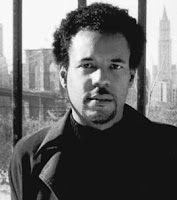 I failed to attend, but The Stranger's Paul Constant was on the scene:
I failed to attend, but The Stranger's Paul Constant was on the scene:The high point of the evening for me came at the end of the (rather weak) question and answer period, when someone asked (in reference to the Richard Ford-spitting-on-Whitehead incident I wrote about in this week’s Constant Reader) whether Whitehead had, in his thirties, reconsidered his distaste for Richard Ford’s writing, particularly the Frank Bascombe novels. After a delicious pause, Whitehead said that there are lots of people who enjoy reading novels about “male menopause,” and that there’s nothing wrong with that, and that it’s great that they never have to wait very long for “The next Frank Bascombe sequel to be churned out.” The laughter was both strong and uncomfortable for the Seattle Arts and Lectures crowd, which does quite a bit of worship at the altar of literary celebrity.
YouTube, j'accuse!
In the same way that Edmund Burke regarded the guillotine in the Place de la Revolution, Siegel regards Gawker and YouTube. And when he writes that "the Internet is possibly the most radical transformation of private and public life in the history of humankind," he doesn't mean "radical" in a nice way (any more than Burke did). Bad times are a-brewing. The "borders of truth" are eroding. Knowledge is "devalued into information." Americans are producing, not enjoying, their own leisure. Our interior lives are being "packaged like merchandise," and "the sources of critical detachment are drying up, as book supplements disappear from newspapers and what passes for critical thinking in the more intellectually lively magazines gives way to the Internet's emphasis on cuteness, novelty, buzz, and pursuit of the 'viral.'"
Posthumously released
A Father's Law, which is being published for the first time on the centennial of his birth, is not just a book for critical theorists, nor is it a book that disappoints. Like Native Son, Black Boy and Uncle Tom's Children, A Father's Law explores the inner conflicts and challenges faced by black Americans as they make their way through a society dominated by white privilege. It is by no means a perfect novel, and it has gaps in its narrative like other unfinished works. But what the book lacks in polish and gloss, it makes up for in the strength and pull of its story, which is surprisingly contemporary for one written close to half a century ago.
American Teachers
As a group, American teachers tend to be more supportive of free-speech rights than other Americans, but when compared to other Americans with 16 or more years of schooling teachers are less supportive of this important democratic value. We see a conservative tendency when we examine teachers’ family values as well. Though better educated Americans tend to be more liberal, teachers appear to be somewhat of an exception. On homosexuality and abortion, teachers tend to be more liberal than lesseducated Americans but more conservative than those with high levels of education. Teachers also attend church and pray more than nonteachers, additional indications of their conservative leanings. Finally, over the past four decades, support among teachers for the liberal view that the government should help the poor has declined more sharply than it has for other Americans.
Sunday, January 13
The Braindead Megaphone
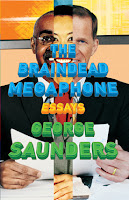 A wonderful book full of humor, heart and keen insights on culture and politics. While the most substantive essays are a trio of travelogues (a trip to Dubai, a drive along the Mexican/American border and a visit with the "Buddha Boy" of Nepal) the collection offers a nice variety of musings political, comical and literary. Included is "Ask the Optimist!" an advice column spoof that originally appeared in The New Yorker and was later featured in a puppet production by The Sound of Young America. Of particular interest to this blog are Saunders' essays on Twain and Vonnegut. In the latter, "Mr. Vonnegut in Sumatra," Saunders discusses his understanding of writers and writing before he encountered Vonnegut's Slaughterhouse Five in the Sumatran jungle at the age of twenty-three:
A wonderful book full of humor, heart and keen insights on culture and politics. While the most substantive essays are a trio of travelogues (a trip to Dubai, a drive along the Mexican/American border and a visit with the "Buddha Boy" of Nepal) the collection offers a nice variety of musings political, comical and literary. Included is "Ask the Optimist!" an advice column spoof that originally appeared in The New Yorker and was later featured in a puppet production by The Sound of Young America. Of particular interest to this blog are Saunders' essays on Twain and Vonnegut. In the latter, "Mr. Vonnegut in Sumatra," Saunders discusses his understanding of writers and writing before he encountered Vonnegut's Slaughterhouse Five in the Sumatran jungle at the age of twenty-three:Writing was, at this stage in my development, the process of trying to do whatever was most unnatural. Art was the thing you couldn’t quite reach. The hope was that someday, when enough failure had been logged, a miracle would happen, and one would briefly be launched above ones station, suddenly able to write in that impossible, inscrutable, ninteenth-century language of the masters, and this miracle would happen often enough that one could eventually cobble together the two hundred or so pages it took to make it a Real Book.Those familiar with Saunders' fiction know that it is anything but unnatural and inscrutable. He writes with an ease and a warmth that is very much reminiscent of Vonnegut. In "The United States of Huck Finn" Saunders breaks down the narrative structure of Twain's classic and submits the following on the differences between Huck and Tom:
Huck and Tom represent two viable models of the American Character. They exist side by side in every American and every American action. America is, and always has been, undecided about whether it will be the United States of Tom or the United States of Huck. The United States of Tom looks as misery and says: Hey, I didn’t do it. It looks at inequity and says: All my life I have busted my but to get where I am, so don’t come crying to me. Tom likes kings, codified nobility, unquestioned privilege. Huck likes people, fair play, spreading the truck around. Whereas Tom knows, Huck wonders. Whereas Huck hopes, Tom presumes. Whereas Huck cares, Tom denies.More Saunders:
Saturday, January 12
Friday, January 11
Thursday, January 10
The Home Stretch
I'm just saying, if I can do it, so can you.
Wednesday, January 9
Sheeeeeeit Part II
Tuesday, January 8
Stories
Bibliotherapy!
Bibliotherapy, as it's called, is a fast-growing profession. A recent survey suggests that "over half of English library authorities are operating some form of bibliotherapy intervention, based on the books-on-prescription model". That's to say, an increasing number of people are being referred by their GPs to the local library, where they'll find shelves or "reading pharmacies" set aside for literature deemed relevant to their condition.
Monday, January 7
Borges' infinite encyclopedia
A growing number of contemporary commentators — whether literature professors or cultural critics like Umberto Eco — have concluded that Borges uniquely, bizarrely, prefigured the World Wide Web. One recent book, “Borges 2.0: From Text to Virtual Worlds” by Perla Sassón-Henry, explores the connections between the decentralized Internet of YouTube, blogs and Wikipedia — the so-called Internet 2.0 — and Borges’s stories, which “make the reader an active participant.
Sunday, January 6
Around Seattle
And speaking of Elliott Bay Book Co., I was in there last weekend when I encountered a rather hilarious pair of young hipster of literati. One said to the other: "I stopped reading Russian literature in late 2003 because (indecipherable)."
In light of our less-than-successful efforts to jump-start a Dostoevsky book club I was curious to see where this was going. I slithered from the M's to the D's and mindlessly leafed through The Salterton Trilogy with I'll surveilled the audio.
Fellow #1: "Have you read this?"
Fellow #2: "Yes, but I can't help but think it's a bad translation."
Fellow #1: "Why do you say that?"
Fellow #2: "I've always felt that translations of Chinese can get away with being lazy because no one will ever be able to check them for accuracy."
Fellow #1: "You're right, I hadn't though of that. Nobody speaks Chinese."
WTF? I am hard pressed to think a more eurocentric utterance I've overheard while browsing in a bookstore. And I've heard some dumb shit along these lines but nothing quite so profoundly idiotic . The most populous country in the world and nary a literary scholar speaks the language? You're right, I hadn't thought of that. It makes really unhappy that I missed hearing why the fellow stopped reading Russian literature.
"...it didn't match my man purse."
"...it was too painful after the murder of Ivan Calderon."
"...after reading The Da Vinci Code it was hard to take Tolstoy seriously."
Whatever it was, I am sure it was memorable.
Saturday, January 5
New book on Ben's mildly detestable neighborhood
The tremendous social transformation of the area, from a tiny, 19th-century settlement of land-mad white Americans to a dense, 21st-century inner-city district dominated by property-mad developers (from a wilderness of trees to a wilderness of construction cranes and "condominium canyon[s]"), is the substance of Humphrey's short and simple book.
Sheeeeeeit
Some years ago, Tom Wolfe called on novelists to abandon the cul-de-sac of modern “literary” fiction, which he saw as self-absorbed, thumb-sucking gamesmanship, and instead to revive social realism, to take up as a subject the colossal, astonishing, and terrible pageant of contemporary America. I doubt he imagined that one of the best responses to this call would be a TV program, but the boxed sets blend nicely on a bookshelf with the great novels of American history.
How to Talk About Books You Haven't Read
Pierre Bayard is a Paris-based professor of French literature. As such, he is a practised charlatan, a literary bullshitter, a professional 'non-reader'. 'Because I teach literature at university level,' he says, regretfully, 'there is, in fact, no way to avoid commenting on books that most of the time I haven't even opened.'
Friday, January 4
On: The hopeless task of publishing your first novel
Should I bother to try to publish my novel?Yes...
* Hundreds of first novels appear each year. Some do well, and not all of their authors are young, beautiful or already famous
* No agent or publisher ever knows for certain what will work. Their doors, and minds, must stay open out of self-interest
* Beyond the traditional houses, digital media have widened the choices for DIY publishing and greatly improved its status
No...
* Serial rejection and long months of disappointment await for the vast majority of wannabe novelists
* Writing your book, and making sure that friends and family can read it, might amount to as much authorship as you really want
* Far too many published novels clog an overcrowded marketplace. Even if you made it into print, your book might well sink without trace
God bless the white elites
At one Manhattan couple’s weekend home in the Catskills, books seem to have a life of their own. Molly Stern, the editorial director for fiction at Viking/Penguin, and Jay Mandel, a literary agent at William Morris, have a restored farmhouse on 50 acres in Jeffersonville in Sullivan County, N.Y., where, not surprisingly, they have a lot of books. They also have frequent house guests and sometimes lend the house to friends.
The attic loft houses what Ms. Stern calls “well-loved” books, like a first edition of “White Teeth” by Zadie Smith. Children’s books are on the second floor. The first floor has books on gardening and cooking “as well as tabloid magazines and newspapers.” As a counterpoint to the rural setting, they keep handy a copy of “The Works: Anatomy of a City” by Kate Asher. Other favorites include the crime novels of George Pelecanos.
“It’s great to see what happens to books when you’re not there,” Ms. Stern said. “Lorrie Moore’s ‘Birds of America’ migrates from the loft to a bedroom. John Cheever frequently finds his way into a guest room.” One time, Ms. Stern said, she arrived at the house to find Emily Dickinson waiting to be read in the master bedroom.